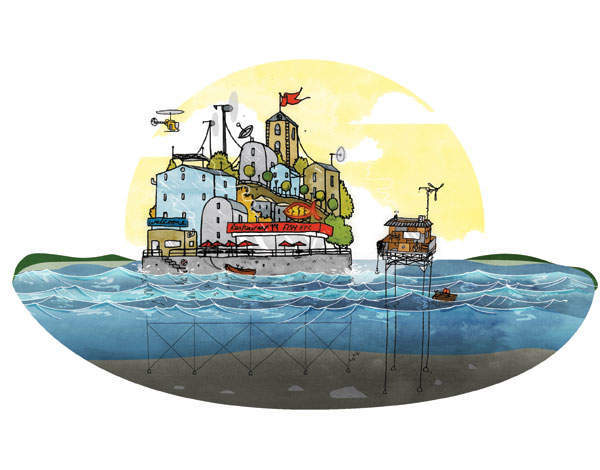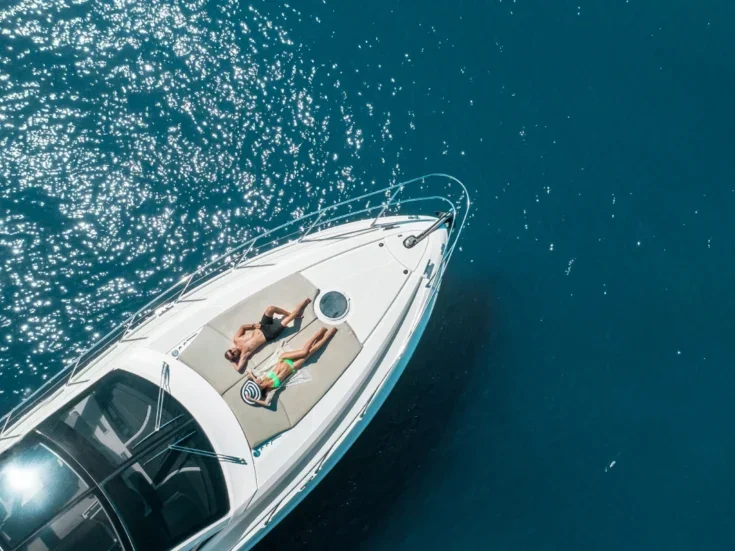

The seasteading dream is simple, and its appeal is obvious to anyone who’s ever opened a newspaper and despaired at the thought of being governed by one useless politician or another. The concept is that like-minded individuals build their own islands and become members of a new floating city-state, beholden to no one. This was supposed to be the year of the seastead — as late as this spring, several full-scale seasteads were promising that they would be opening their doors in a variety of locations by August this year.
The idea is not new — maybe it’s as old as colonisation. However, with no new land to discover and settle, today’s pilgrims are forced to construct their own land. It’s been tried several times in the past 50 years and in almost every case it has ended in disaster. From the five-month-long ‘Republic of Minerva’ (built on a Tongan coral reef and overthrown by the Tongan police) to ‘Operation Atlantis’ (a concrete ship which sank before anyone could take up residence), the idea has always foundered by running up against the law of nation states or the much less forgiving laws of nature.
The legal challenges are enormous unless you base yourself outside any nation’s territorial waters; and the further you get out to sea, the more difficult the technical and engineering challenges become. With most nations claiming some jurisdiction out to 200 miles off their coast, you’re looking at places at the mercy of the open sea — and if the thing floats, a 200-mile journey to civilisation isn’t that appealing to most people looking for a quick commute.
The simple truth is, as much as governments may frustrate people, they don’t frustrate people enough to consider swapping a beautiful penthouse in a bustling city for what (up until now) amounts to a box-room in a converted oil platform, with no parks, no theatres and no cultural life.
However, in the past decade seasteading has had a new lease of life. In a large part this is down to think-tank The Seasteading Institute (TSI), funded by Paypal co-founder Peter Thiel. Thiel is a huge enthusiast for seasteading and has gone as far as describing it as ‘necessary for the future of humanity’.
Seasteading is also growing in reaction to what people see as the ever-swelling size of government. For the first time, there are plenty of people (many from Silicon Valley) with the money to fund serious research. What was once a libertarian bedroom fantasy project is now being studied by professionals — both lawyers and engineers — in a systematic way, and is looking more and more realistic. I spoke with Randolph Hencken, one of the directors of TSI, and he was extremely bullish.
‘If everything goes well, I expect to see the first floating city in the next five to six years,’ he says. Many of the designs on the TSI website completely change the idea of what a seastead might look like from the ugly previous visions to the sci-fi dream. The designs are practical yet pleasant — most actually look like floating cities as opposed to glamourised oil rigs, and the technology to stabilise them, power them and deal with waste is maturing rapidly, so no more worries about perpetual seasickness and a troglodytic nautical experience.
So seasteading is now technologically possible and potentially quite pleasant; I suppose the next question is: why would you do it?
The tax implications are the most obvious. For residency reasons, a seastead is an effective tax haven (for non-US citizens, at least). While it seems extreme to move entirely to sea to avoid tax, in a world where some HNWs will sleep on jets to avoid hitting their 90-day residency limit in various jurisdictions, perhaps a seastead is a better option. Equally, I can see the appeal of living on a beautiful, exclusive cruise ship year-round, as opposed to being domiciled in a dump like Zurich or Guernsey.
On top of the tax implications, there are other business reasons for wanting to base yourself afloat. Much as with cargo ships, you can indulge in a certain amount of what Hencken describes as ‘jurisdictional shopping’, depending on the local rules. For example, a large number of regulations can be avoided — there is a strong interest from the scientific community, especially in areas such as biotechnology and surgery.
Of course, these are all the hard-headed reasons you might take the plunge. If you speak to seasteading enthusiasts or American libertarian HNWs, these often take a back seat to more emotional reasons like becoming a pioneer, the ability to own the underlying assets where you live and the ability to experiment with new forms of government.
As mentioned earlier, 2014 was supposed to be the year of the seastead. As late as October last year, one major project, Blueseed, had confidently predicted its seastead would be up and running by summer this year. The concept behind Blueseed was that it would be a seastead just off the coast of San Francisco which would act as a hi-tech incubator, enabling Silicon Valley firms to bypass visa restrictions for staff, acting as an offshore tech hothouse as well as being a pleasant place to live.
However, it seems not to have come to pass; no ship or platform was ever actually purchased and people close to the project tell me that official opposition to the plan (particularly around cables to the shore) has scuppered the company.
Perhaps this failure demonstrates that the seastead dream will never actually come to pass; much like commercial space travel, there will always be ambitious plans looking for cash, but they will always fall through, or be indefinitely postponed.
While lamenting the failure of Blueseed, Hencken told me that the failure had convinced him of the folly of trying the seasteading dream in First World waters. ‘It won’t happen in Europe or the US,’ he said. However, he remained optimistic that the 2020 goal will be hit.
He tantalisingly added that TSI was in discussions with several developing-world nations ‘at the very highest level’ about siting the seastead he expects to be up and running under the TSI banner by 2020. The plan is to cut a deal with one of these developing-world governments and operate under the flag of the host nation, albeit with substantial autonomy.
He wouldn’t be drawn on exactly where it was most likely to be based; he mentioned nations in Africa, South-east Asia and the Caribbean, which all seem like they might fit the bill. I could certainly imagine a Caribbean location being appealing because the continental US would be relatively close, and let’s face it, the weather doesn’t hurt.
Maybe it will come off; seasteading seems to work best when it takes small steps and threatens no one. As to whether anyone will want to live there, it’s an open question, but given that some HNWs want passports for everywhere and residences almost nowhere, a platform in the middle of the ocean, beyond government and tax and law and society, makes its own peculiar sense.







